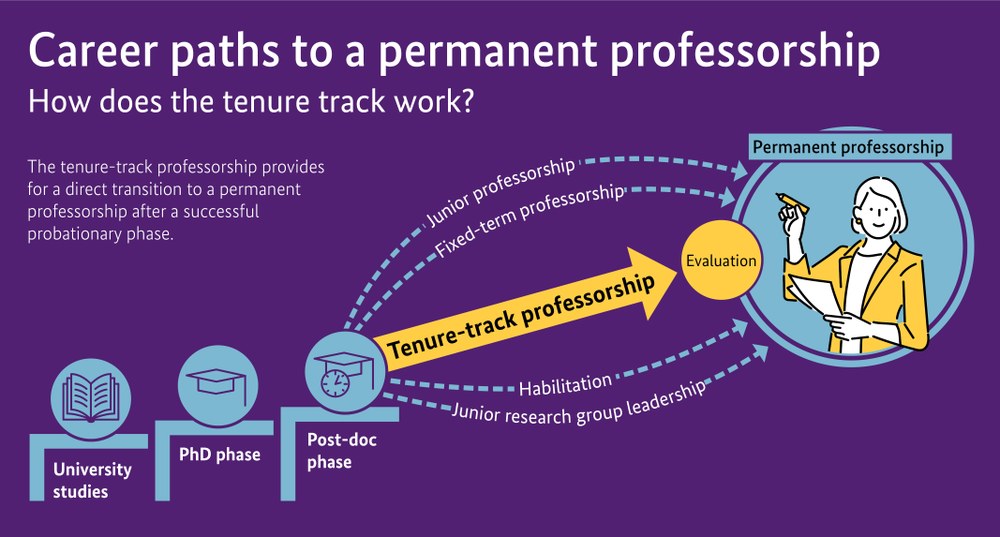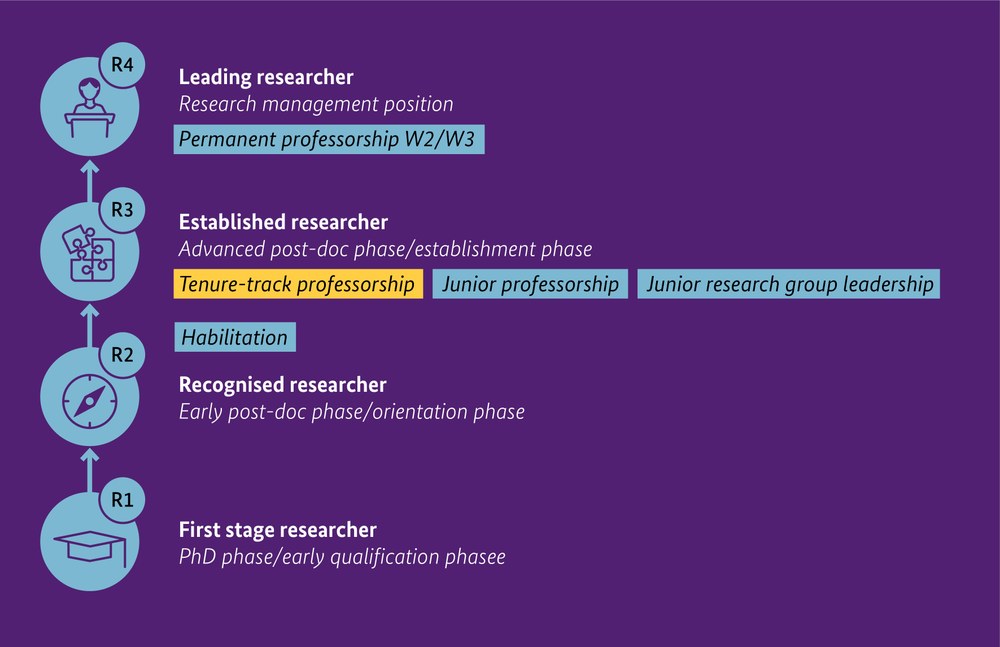
Tenure Track in Germany

The tenure-track professorship is an attractive career path for young scientists on the way to a lifelong professorship. A commitment to the transfer to a lifelong professorship pending a successful evaluation is made at the time of application – independently of the university’s job situation.
VIDEO: THE TENURE-TRACK PROFESSORSHIP IN GERMANY
© VDI/VDE-IT
THE PATH TO THE TENURE-TRACK PROFESSORSHIP

Prerequisites, the filling of open positions, evaluation and the procedure are clearly defined for the tenure-track professorship, making the career path transparent and predictable.
A tenure-track professorship position is initially filled by a university with a scientist for a limited term, usually six years. The transition to a lifelong professorship follows a probationary phase with a successful evaluation – the tenure track.

Job advertisement Job advertisements for tenure-track professorships are usually international. As a rule, the professorships are limited to a six-year term (see section “Tenure-track phase”) and assigned to remuneration group W1 or W2. The remuneration in Germany is the monthly income of civil servants. Remuneration groups for professors with tenure are W1, W2 and W3 (see excursus). |
Appointment procedure Candidates have to go through the regular, quality-assured appointment procedure, i.e a selection process established at German universities. Performance aspects to be subsequently evaluated that are required for the transition to the lifelong professorship are defined at this point. Individuals who are already on the professorship career path can also apply for a tenure-track professorship, but still have to go through the appointment procedure. Universities regulate the details of their appointment procedure in their statutes. |
Tenure-track phase As a probationary period, the tenure-track phase is usually limited to a term of six years but can be extended in case of part-time employment or parental leave. Tenure-track professors assume the title of professor along with the tasks and obligations of a regular professorship in this phase. They are assigned an appropriate budget but also obtain third-party research funds (external funding) in addition to the university’s basic budget. |
Evaluation A transparent evaluation procedure follows the end of the tenure-track phase. Depending on the federal state, an interim evaluation may be conducted after three years. The evaluation determines whether the performance aspects defined as part of the appointment have been met. A decision for or against tenure is made exclusively based on performance, notably in research and teaching. Performance in academic self-administration and obtaining external funding may be included in the evaluation criteria depending on the state and university. |
Transition to the lifelong professorship The transition to the lifelong professorship follows a successful evaluation. Financial or strategic considerations of the university along with the availability of an open tenure position are excluded here. |
EXCURSUS: ACADEMIC CAREER PATHS IN GERMANY
The tenure-track professorship is one of several possible paths to a lifelong professorship in Germany. A junior professorship, junior research group leadership or habilitation are other options. The scientific career path after the conferral of a doctorate comprises various phases that are explained here.
These phases are defined by the “European framework to attract and retain research, innovation and entrepreneurial talents in Europe” in a nomenclature from R1 to R4.

Paths to a professorship In the post-doctoral phase R3, researchers have various options for qualifying for a lifelong professorship. |
Junior professorship Junior professors are appointed as temporary civil servants for three years with a three-year extension option or employed under a collective agreement with a fixed-term contract. Prerequisites for the junior professorship are the completion of university studies, pedagogic suitability and a special aptitude for scientific work. Depending on state law, the junior professorship may replace the habilitation as a prerequisite for a lifelong professorship. Junior professorships can also be tenure-track professorships. |
Junior research group leadership As the leader of a working group with doctoral candidates, student assistants and, where applicable, technical staff, scientists can conduct independent research with an appropriate budget and good infrastructure, as a rule for a period of five years. However, junior research group leadership does not lead directly to a lifelong professorship as a rule. |
Habilitation The habilitation is the classic path to a professorship in German-speaking regions. A candidate who successfully masters the habilitation or whose accomplishments are equivalent to a habilitation has proven their thematic, methodic and pedagogic mastery of their field and receives the teaching qualification. After the habilitation, a successful application to a university leads to a lifelong professorship. |
Tenure-track professorship The tenure-track professorship is a predictable additional path to a lifelong professorship. Initially the scientist is employed by a university for a fixed term. Unlike other fixed-term professorships, the tenure-track professorship includes a commitment to be transferred to a lifelong professorship (remuneration group W2 or W3, or equivalent salary) after a successful tenure evaluation, without a further application process. |
Lifelong professorship A lifelong professorship in Germany means that a professor is a civil servant for life or permanently employed. For life means that a person appointed as a civil servant or permanently employed cannot be readily dismissed from service. Additional benefits of the civil servant status include attractive remuneration and a good retirement plan. |
Civil servant status of tenure-track professors The civil servant status of professors is a special feature of the German academic system. Tenure-track professors can be designated as temporary civil servants at the time of appointment. The permanent civil servant status is then obtained after a positive evaluation and transition to a lifelong professorship. Professors can only obtain the civil servant status at government universities. Professors with tenure do not receive wages but a salary. The remuneration levels for professorships in Germany are the W-levels (W1 through W3) and differ between the federal states. Upon reaching retirement age, professors with tenure are entitled to a pension that is usually higher than in an employment relationship. |
Remuneration groups W1, W2 and W3 The assignment of a professorship to a W-group determines the remuneration of professors: Junior professors on the tenure track are assigned to remuneration group W1 while W2 professors on the tenure track receive higher remuneration according to W2. Upon transition to a lifelong professorship, they receive remuneration according to W2 or the highest remuneration group W3. The basic salary varies between federal states. |